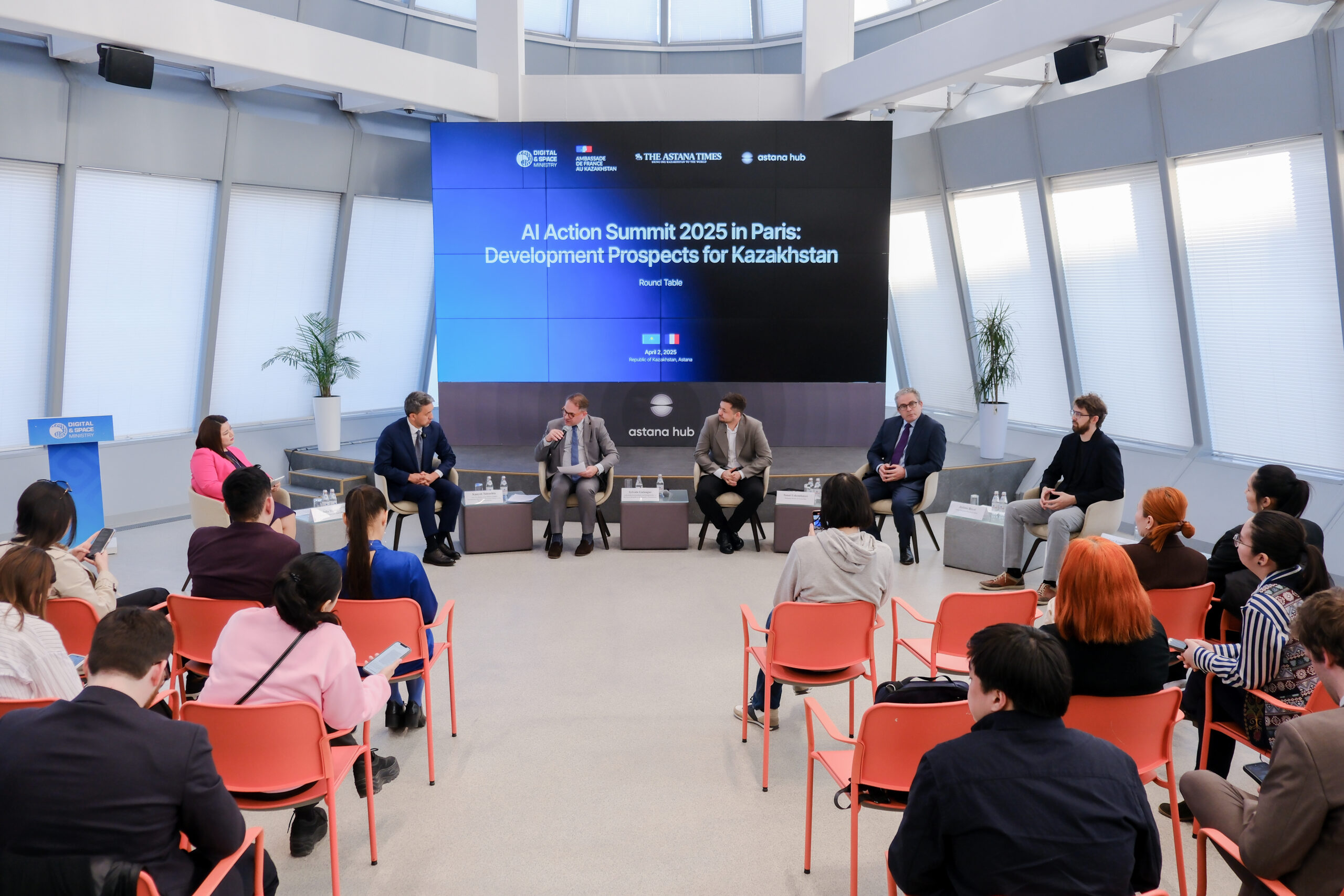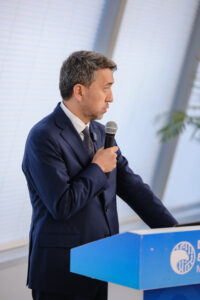ASTANA — The Embassy of France in Kazakhstan and Astana Hub, in collaboration with the Kazakh Ministry of Digital Development, Innovations, and Aerospace Industry, hosted an insightful roundtable discussion at Astana Hub on April 2. The event explored the key takeaways from the AI Action Summit held in Paris earlier this year and the growing opportunities for collaboration between Kazakhstan and France in the rapidly evolving field of AI.

Ambassador Guiaugue emphasized the importance of collaboration in laying the foundation for AI’s sustainable and ethical future. Photo credit: Astana Hub
The roundtable brought together a diverse group of influential figures, including the First Vice Minister of Digital Development, Innovations, and Aerospace Industry of Kazakhstan Kanysh Tuleushin, Ambassador of France to Kazakhstan Sylvain Guiaugue, Managing Director of Astana Hub Tanat Uskembayev, Director of Alstom for Central Asia Jérôme Boyer and founder of startup HubLab.ai Ivan Kononov. As the event moderator, I had the privilege of guiding the conversation and helping unpack the key points discussed during this crucial discussion.
Kazakhstan’s AI vision: investments and regulation

The First Vice Minister Tuleushin emphasized that AI is not just a technological shift but a fundamental move for the country’s education and economy. Photo credit: Astana Hub
The First Vice Minister of Digital Development, Innovations, and Aerospace Industry of Kazakhstan, Kanysh Tuleushin, opened the discussion with a clear statement on the country’s AI vision. He emphasized that AI is not just a technological shift but a fundamental move for shaping the future of the country’s education, economy, and international partnerships.
“We are building our AI ecosystem with initiatives such as the creation of a national AI Center, Alem.AI. This center will support research, education, and startups, playing a crucial role in nurturing the entire ecosystem,” Tuleushin shared.
He highlighted that a key priority for Kazakhstan is human capital development, aiming to provide AI education and training to over 200,000 citizens annually, including students, professionals, and public servants.
In addition to human resources, Kazakhstan also focuses on infrastructure development to support its AI ambitions. Tuleushin mentioned the country’s recent acquisition of critical computing hardware, which will facilitate the creation of national AI models, including language models and AI assistants.
“This infrastructure will enable the implementation of our national AI platform and advance various AI projects,” he noted.
Tuleushin also revealed that Kazakhstan is preparing its first national AI law to ensure the technology’s safe and ethical use, furthering its commitment to responsible AI development.
France’s global AI efforts, bilateral prospects for growth
Ambassador of France Guiaugue shared key insights from the AI Action Summit in Paris, a major political event to foster international dialogue on AI’s future. Ambassador Guiaugue emphasized the importance of collaboration in laying the foundation for AI’s sustainable and ethical future.
“At the summit, over 100 countries participated to discuss the kind of AI we want to develop—an AI that is ethical, inclusive, democratic, and sustainable,” he stated.
Guiaugue also pointed out the importance of framing AI development within the broader context of international cooperation. He explained that AI’s future could follow a purely capitalistic, aggressive approach or one rooted in values like ethics and inclusivity. France, he argued, stands firmly for the latter, advocating for AI that serves the public good.
The French ambassador also highlighted the growing collaboration between Kazakhstan and France in the AI sector. He commended Kazakhstan for its commitment to the political declaration at the summit, signaling a shared vision for responsible AI development. He also shared positive feedback from French companies that had shown keen interest in Kazakhstan’s market post-summit.
“French companies are impressed with Kazakhstan’s strong academic foundation for AI development. The level of knowledge among Kazakh students is exceptional, making the country an attractive market for French firms,” Guiaugue said.
Kazakhstan’s involvement in the Global Partnership for AI, co-founded by France, presents valuable opportunities for both countries. This partnership allows Kazakhstan to exchange best practices in AI regulation, learn from global experts, and align its AI legislation with international standards. French educational models, like the “Tomorrow School,” are also being introduced in Kazakhstan, further strengthening the collaboration between the two nations.
As the discussion continued, tangible opportunities for collaboration were presented. French companies are eager to invest in Kazakhstan’s strong talent pool, with potential projects in smart cities and digital connectivity. For example, Guiaugue discussed the pilot project in Taldykorgan, which focuses on smart city initiatives. According to him, this is an excellent example of how the two countries can work together to build AI-powered urban solutions.
Alem.AI: Kazakhstan’s flagship AI project
Astana Hub Managing Director Tanat Uskembayev provided insights into Alem.AI, which is set to become a flagship project in Kazakhstan’s AI ambitions.

Astana Hub Managing Director Uskembayev provided insights into Alem.AI, which is set to become a flagship project in Kazakhstan’s AI ambitions. Photo credit: Astana Hub
“Our ecosystem now includes over 1,600 participants, including startups, tech companies, and R&D centers. These entities have collectively generated $3.2 billion in revenue and attracted $731 million in investments. We have also expanded our international presence, opening hubs in the United States, Saudi Arabia, Singapore, and the United Kingdom,” Uskembayev shared.
Alem.AI will be a multi-functional AI center spanning seven floors with distinct purposes. The first floor will host public exhibitions and AI-related events, including a museum showcasing AI’s history. The second and third floors will house a Center for Creative Technologies, providing free education in AI disciplines for 10,000 schoolchildren aged 12-18.
The fourth and fifth floors will accommodate Tomorrow School, Kazakhstan’s first peer-to-peer AI programming school, modeled after the French 01 Edu System. The school, offering a 24-month program with over 50 projects and 20 programming languages, requires no prior coding experience.
On the sixth floor, an AI campus will support 100 new AI startups annually, fostering innovation and entrepreneurship. Meanwhile, the seventh floor will be dedicated to R&D labs focusing on AI-driven solutions. The center will also house an AI-powered government analytics hub to enhance digital governance.
The second part of the discussion is coming up soon. It will focus on pragmatic applications of AI and the challenges Kazakh startups face today.
